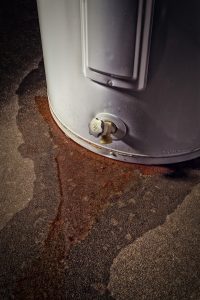 Water heaters look like sturdy devices. They should be: they’re essential parts of any home and must work almost every day of the year. As long as the water heater serving your household was professionally installed and receives routine maintenance each year, it should last more than a decade and possibly two.
Water heaters look like sturdy devices. They should be: they’re essential parts of any home and must work almost every day of the year. As long as the water heater serving your household was professionally installed and receives routine maintenance each year, it should last more than a decade and possibly two.
But the end comes eventually for any water heater, and to head off possible loss of hot water to your house and other headaches, you want to catch the early signs that your water heater is in the final stages. Below are the five most common signs you’re ready for a water heater replacement.
#1. Decline in hot water volume
This is the biggest warning that a water heater can no longer do the job for which it was originally installed. When members of your family start to defy logic and try to get up earlier and earlier in the morning so they can get the few hot showers available before the water runs cold, it’s time to investigate getting a new water heater. Can repairs fix this? It’s possible, but consult with your plumber about how cost-effective continuing with repairs is compared to a replacement system.
#2. Rusty-red discoloration in the hot water
You expect to see a rusty discoloration in the water from your taps after you return from a vacation. It usually takes less than a minute for the water to run clear. But if you start to see this discoloration coming from the hot water taps—and the hot water only—it means the tank of the water heater is rusted through and the time to replace it is now.
#3. Extensive, regular leaks
The only place where water should escape from the tank of a water heater is through the pressure release valve, and that’s only a few drips. When you start seeing water puddling around the tank, it’s a serious issue. For a young water heater, this could be due to high water pressure. If it’s an older water heater, it can indicate corrosion getting hold, and that means it’s time to get a new water heater.
#4. Visible corrosion
Some corrosion spots on a water heater can be fixed, such as if the corrosion is on the heat exchanger and the part can be replaced. But usually, if you see corrosion, it’s the end of the line for the water heater. When you see corrosion on the outside of the tank, it’s probably already spread to other parts you can’t see, and the whole system is in jeopardy.
#5. Out of control heating bills
An ancient water heater will be an inefficient one, and that will cause your energy bills to rise. A water heater consumes more energy than most systems in your house, so when it loses efficiency that corresponding leap in heating bills will be easy to notice.
We are a top resource for water heaters in St. Louis and install the top brands for homes: Rheem, Rinnai, Bradford White, Kohler, and more.
Performance Plumbing, where Your Problem is No Problem! Schedule water heater replacement with our experts.
